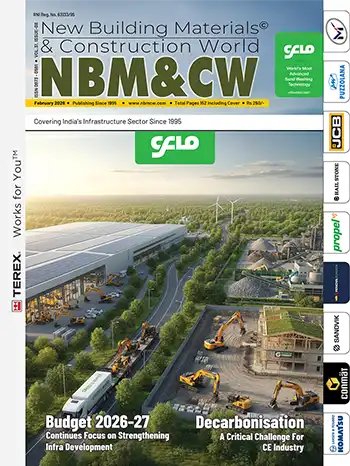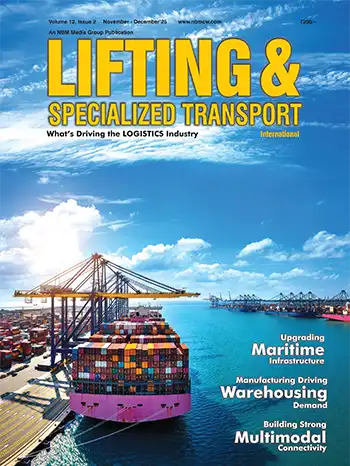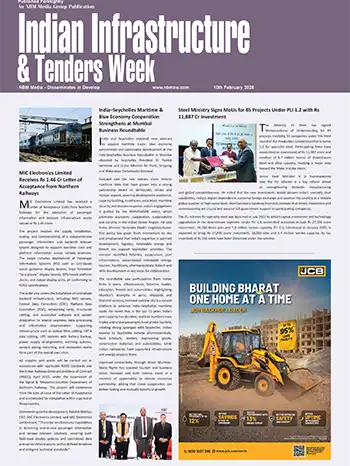How was the concept of an online marketplace for the construction industry developed?
Amit Malhotra: The creation of McCoy Mart stemmed from the challenges and traditional working methods in the B2B construction industry. With the advent of digital and software development, the emergence of e-commerce platforms, and enhanced logistics and supply chain development in India, we were able to build McCoy Mart into India’s leading e-commerce and SAAS platform for the construction industry, despite the challenges of low digital adoption in the construction industry.Digital transformation is immersing every industry, and the construction industry, which contributes 9% to the nation’s GDP which includes real estate and building products, is now on the cusp of this revolution. These platforms aren’t just adding convenience – they’re making the industry faster, smarter, and more efficient.
Amit Malhotra
What does the McCoy Mart platform offer the construction industry professionals?
Rahul Sahani: McCoy Mart is a digital marketplace for construction and building materials, for architects, developers, builders, consultants, interior designers, and homeowners. It offers a comprehensive platform for building materials like wood, lighting, electricals, furniture hardware, kitchens, tiles, flooring, sanitaryware, bath fittings, smart locks & lockers, ceilings, partitions, construction chemicals, and much more. In fact, the platform covers the entire spectrum of the construction industry.As a B2B e-commerce store, it provides an extensive selection of construction products at wholesale prices, with dedicated account managers to ensure on-time delivery with live tracking.
What challenges had to be addressed in starting McCoy Mart?
Rahul Sahani: One of the most significant challenges was navigating the highly unorganized construction industry and overcoming the low level of digital adoption among both customers and vendors. We had to innovate and adapt. We developed an in-house stack to address the challenges faced by construction professionals in product procurement, streamlining operations, and saving valuable time. We also created an app, empowering users to efficiently manage products, projects, and leads, reducing administrative burdens, and focusing on business growth.While the journey to digital transformation in construction is still evolving, challenges such as cybersecurity, data privacy, and the need for clear regulations remain. Advancements in technology can address these issues effectively and in time. This transition will significantly mitigate the risks tied to traditional, informal practices and will pave the way for a more reliable and forward-thinking construction sector.
The future of the construction industry is evidently digital, with online marketplaces driving this change. So, the question isn’t if these changes will happen but how quickly they’ll reshape the entire landscape.
How can an Online Marketplace revolutionise the Construction Industry?
Amit Malhotra: The Indian construction industry has relied heavily on informal practices to date, which have often led to a lot of challenges like misunderstandings over costs, delays in sourcing materials, and a lack of transparency with very little documentation, resulting in project delays. The emergence of online marketplaces can address these issues by allowing users to find products and people in one place and also bring all transactions into a digital, transparent environment to provide clear, written records of every deal.Today, online marketplaces in the construction industry are becoming synonymous with Zomato for construction material delivery and product research. Users can easily find what they are looking for, wherever they are, and all in one place. They can get their products delivered within a timeframe, at discounted rates, and after reading customer reviews.
What are the advantages of Online Marketplaces?
Amit Malhotra: Online marketplaces are bringing contractors, suppliers, and manufacturers together in one place, which is speeding up the procurement process and reducing costs.Users can now quickly ask for quotes from several suppliers and bidders for any product or brand irrespective, choose the one that fits their budget and timelines, and track orders in real-time. This means less guesswork and fewer mistakes, which helps keep projects on track and within budget.
Managing the supply chain in construction can be complicated, especially for large projects that involve multiple vendors, service providers, and tons of construction material. Online marketplaces help by showing you data from many different suppliers, helping users choose the one that offers the best quality and price and offers higher reliability. This reduces the risk of running into problems like material shortages or delivery delays, making the supply chain more dependable.
How are Online Marketplaces bringing ease and convenience in the selection and purchase of construction materials?
Rahul Sahani: Construction materials often come with intricate details, specifications, and comprehensive product information. Online marketplaces make the complex product information easy as they manage and categorize various material types and publish precise and relevant details about each product, enhancing the selection process based on dimensions, certifications, and other factors.The future of construction does not lie in bricks and mortar but in online marketplaces – transforming how materials are sourced, projects are managed, and users connect with suppliers.
Rahul Sahani
The construction industry has unique needs that require customized digital solutions. Users in the space understand building relationships with vendors that offer flexible or bulk pricing, efficient catalogs, and real-time inventory updates. However, only a few are able to deliver effective and convenient customer experience. Online marketplaces can provide data for suppliers and technicians specific to users’ needs after taking them through a step-by-step survey. They also streamline logistics, making it easier to handle products of different sizes and shapes.
How do Online Marketplaces help save costs for the buyers?
Rahul Sahani: By connecting buyers and users directly, online marketplaces are saving construction companies money by eliminating unnecessary miscellaneous costs. Digitization of the purchase processes has automated manual tasks like quoting, ordering, and invoicing, further streamlining operations and saving time and resources. Moreover, with access to a wide range of products at competitive prices, companies can manage their budgets more effectively. This not only helps keep project costs down but also boosts profitability and client satisfaction.How is the Indian Government supporting the concept of Online Marketplaces?
Amit Malhotra: The government of India has already laid the groundwork for technological adoption with its e-Marketplace (GeM) portal. However reluctant the suppliers or service providers maybe, the desire and enthusiasm to work with the government has empowered them to take the first step towards digitization – helping streamline planning and cost management. This is the stepping stone towards a brighter, more technologically advanced future for India.What are your expansion plans for McCoy Mart?
Amit Malhotra: We are aiming for a revenue target of Rs. 100 crore in FY 24-25 and expansion into south and west India. Our strategic expansion is being driven by the thriving construction activities in these regions and the substantial market gap for accessible online construction products.We are currently strong in key cities across the Delhi/NCR and Chandigarh Tricity (Chandigarh, Mohali, Panchkula, Zirakpur) regions, where we have a customer base of over 1,000 active clients. With our well-established and efficient supply chain, we are confident of serving the emerging markets of South and West India over the next year.
Our entry into new markets is not just about expansion; it’s about changing the way construction professionals access the products and services they need. With our current base of 25,000 registered customers, we aim to grow this number to 100,000 professionals in the coming year.
















